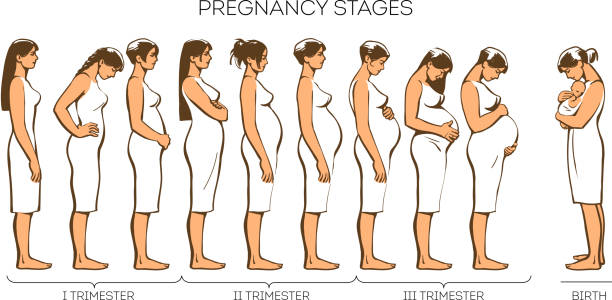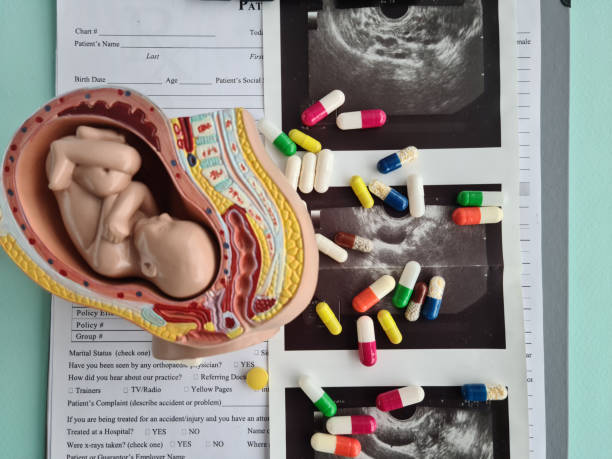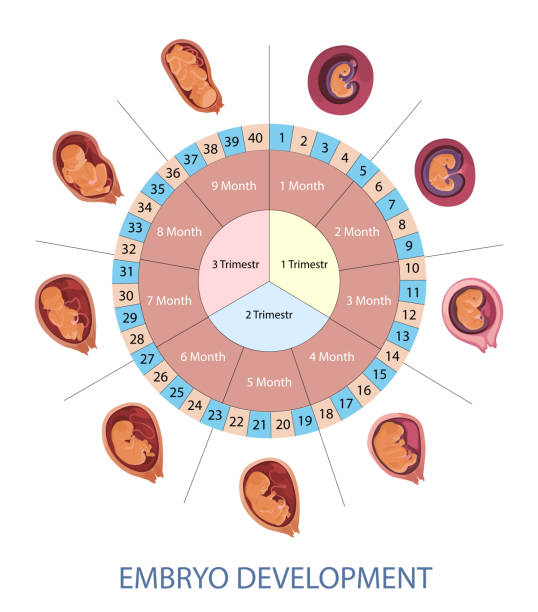
Learn About The 6 Week Abortion Ban in Orlando, Fl
Perhaps being pregnant at this point in your life wasn’t part of the plan. Life often takes unexpected turns, and you may find yourself facing
Are you considering starting a family, or have you recently discovered it’s been a long since your last menstrual period? Congratulations! Pregnancy is an exciting time but can also be a bit overwhelming, especially if you’re a first-time mother. At Choices Women’s Clinic, we understand that navigating pregnancy can be challenging, and we’re here to support you every step of the way.
One of the first things expectant mothers need to understand is pregnancy trimesters. You may have heard the term before but might be unsure what it means and why it’s essential. This blog post will answer many expectant mothers’ questions: “How many trimesters are in a pregnancy?” We’ll explain pregnancy trimesters, how long is a trimester, and what to expect during each stage.
So, whether you’re preparing for childbirth, read on to learn everything you need to know about pregnancy trimesters. With this knowledge, you’ll be better equipped to care for yourself and your growing baby throughout pregnancy.

Pregnancy is a beautiful and exciting journey that marks a new beginning for expectant mothers. During early pregnancy, a woman’s body undergoes significant changes to support the growth and development of her baby. These changes occur in different stages, and expectant mothers must understand what to expect.
Understanding the different stages is essential for expectant mothers. Each phase brings unique challenges and milestones, and caring for yourself and your growing baby is necessary. At Choices Women’s Clinic, we offer various prenatal care services to support you.
Let’s Explore!
Before conception occurs, it’s essential to prepare your body. You should maintain a healthy lifestyle during this stage, including regular exercise, a balanced diet, and avoiding alcohol and smoking. If you have any underlying health conditions, addressing them with your healthcare provider before trying to conceive is important.
The first trimester marks the beginning of pregnancy, lasting from 1 to 12 weeks pregnant. Your body will undergo significant changes during this stage to support your baby. You may experience fatigue, breast tenderness, and other physical and emotional changes. These symptoms are more intense than those you have in the menstrual period.
The 2nd trimester lasts from weeks 13 to 28 and is often called the “honeymoon period” of pregnancy. You’ll likely experience fewer symptoms during this stage, and your baby’s development will be more apparent. You may also begin to feel your baby move, an exciting milestone for many expectant mothers.
The third trimester lasts from weeks 29 to 40 and is the final stage of full-term pregnancy. During this stage, your baby will continue to grow and develop, and you’ll experience physical changes such as increased discomfort and fatigue. You’ll also prepare for childbirth during this stage, including attending prenatal classes and packing your hospital bag.
![]()
Pregnancy is a life-changing experience for mothers. It is a journey full of excitement, anticipation, and discoveries. However, it can be challenging and overwhelming, especially for first-time mothers. Understanding the importance of pregnancy trimesters is crucial in helping expectant mothers take care of themselves and their growing babies.
The three trimesters are essential as they mark significant developmental stages for the baby. Expectant mothers need to receive proper prenatal care during the 1st trimester. Prenatal care will help detect potential complications early and closely monitor the mother’s and baby’s health.
During the second, It is important to continue receiving regular prenatal care during this stage to monitor the baby’s growth and detect any potential complications. Additionally, it is a good time for expectant mothers to prepare for childbirth by attending prenatal classes and creating a birth plan.
Regular check-ups with healthcare providers are critical during the third trimester. This stage monitors the baby’s growth and detects any potential complications.
Each trimester of pregnancy brings specific changes and developments for both the mother and the baby. It is essential for expectant mothers to understand these changes and to receive proper prenatal care during each stage of their pregnancy journey.

During this stage, the baby’s organs and limbs will begin to form and experience significant growth. The expectant mother may experience physical changes such as morning sickness, fatigue, and mood swings.
The mother’s body will also change, such as increased hormone progesterone levels, which help prepare the body for pregnancy. The mother’s uterus will also expand to accommodate the baby’s growth.

During this stage, the baby’s growth and development become more apparent, and the mother will feel more connected to their baby as they move and respond to stimuli. The mother’s body will experience physical changes such as weight gain, back pain, and increased appetite.
The mother may also experience changes such as increased levels of energy and improved mood. Additionally, the baby’s senses, such as hearing and vision, will develop during this stage.

The baby will continue to grow and develop, and the mother will experience physical changes such as increased discomfort and fatigue. The mother’s body will experience changes, such as increased levels of the hormone relaxin, which helps prepare the mother’s body for childbirth by relaxing the ligaments and joints in the pelvis.
Additionally, the mother may experience changes such as Braxton Hicks contractions, which are the body’s way of preparing for labor.
It is important to note that the length of each trimester can vary for pregnant women and pregnancy. While the traditional method of dividing pregnancy into three trimesters lasts 40 weeks from first day of your last menstrual period, some women may deliver earlier or later than expected.
Therefore, expectant mothers must receive regular care and work closely with their healthcare providers to monitor their baby’s growth and development. Your healthcare provider can help you understand the changes and developments occurring during each trimester and provide personalized care to meet your needs.
At Choices Women’s Clinic, our team of experienced healthcare providers is dedicated to supporting expectant mothers through every stage of their pregnancy journey.

Understanding trimesters is essential for expectant mothers as it helps them monitor their baby’s growth and development and care for their physical and emotional needs. By understanding the specific changes and developments during each trimester, expectant mothers can prepare themselves for the changes they may experience and take steps to support their baby’s healthy development.
For example, expectant mothers may experience morning sickness and fatigue, which can be managed through proper nutrition and rest. In contrast, during the third trimester, expectant mothers may experience increased discomfort and fatigue, which may require adjustments to their daily routine and sleeping position.
By understanding the changes that occur during each trimester, expectant mothers can take steps to manage their symptoms.
Furthermore, understanding trimesters allows expectant mothers to receive proper prenatal care throughout their pregnancy. Regular prenatal check-ups and testing can help monitor the health of the mother and baby, identify any potential complications, and provide interventions as needed. With proper care, expectant mothers can minimize their risk of complications and increase their chances of a healthy delivery.

Regular prenatal check-ups and testing can help identify potential complications or health issues and provide interventions to ensure a healthy pregnancy and delivery. Here are some of the key reasons why prenatal care is vital during each trimester:
During the first trimester, prenatal care can help confirm the pregnancy and ensure the mother and baby are healthy. Early prenatal care can help identify potential health issues, such as preeclampsia, and provide early interventions to minimize the risk of complications. Prenatal care includes genetic testing and screening to identify potential chromosomal abnormalities or congenital disabilities.
Prenatal care during the second trimester focuses on monitoring the baby’s growth and development and identifying potential complications. Ultrasounds and other imaging tests are used to check the baby’s size, position, and health and identify potential issues, such as placenta previa or fetal distress. Prenatal care during the second trimester also includes screening for gestational diabetes, which can be managed through diet and exercise.
During the third trimester, prenatal care focuses on preparing for labor and delivery. Prenatal check-ups may become more frequent, and non-stress tests and biophysical profiles may be used to monitor the baby’s health and well-being. Prenatal care during the third trimester also includes preparing for delivery, such as discussing birthing options and creating a birth plan.
Healthcare providers use trimesters to monitor and identify potential complications throughout pregnancy. During each trimester, healthcare providers will perform various tests and screenings to ensure that the baby’s blood cells are developing typically and identify any potential issues.
During the first trimester, healthcare providers will perform an ultrasound to confirm the pregnancy and estimate the due date. Blood tests may also screen for genetic conditions or infections that could impact the developing baby.
In the second trimester, healthcare providers will perform a detailed anatomy scan to evaluate the baby’s growth and development. This includes measuring the baby’s head circumference, abdominal circumference, and femur length and checking the heart, kidneys, and other organs for abnormalities. Blood tests may also screen for potential health issues.
In the third trimester, healthcare providers will continue to monitor the baby’s growth and development, checking the baby’s position and estimating the baby’s weight. Non-stress tests may be performed to monitor the baby’s heart rate and movement, and amniotic fluid levels may be checked to ensure the baby is getting enough nutrients.
By using trimesters to monitor fetal development, healthcare providers can identify potential complications early and provide interventions as needed. This includes monitoring for preeclampsia, gestational diabetes, and preterm labor and identifying any possible birth defects or chromosomal abnormalities.
By performing regular check-ups and screenings during each trimester, healthcare providers can ensure that the baby is developing typically and provide necessary interventions to promote a healthy pregnancy and delivery.
At Choices Women’s Clinic, our experienced healthcare providers are dedicated to providing comprehensive prenatal care services to support expectant mothers through every pregnancy journey.

Expectant mothers can experience various emotional changes and challenges throughout each trimester of pregnancy. These changes are a normal part of the pregnancy experience and can be attributed to hormonal changes, physical changes, and the anticipation of a new arrival.
During the first trimester, many women experience fatigue, nausea, and morning sickness, which can be physically and emotionally draining. These symptoms can lead to feelings of anxiety, stress, and even depression in some women. You can try head down position to relax a bit.
Some women may experience new challenges in the second trimester, such as back pain, leg cramps, difficulty sleeping, and increased anxiety about the health and well-being of the baby.
The third trimester can be a time of increased discomfort and emotional intensity. The baby’s growth and movement can be felt more strongly, and the anticipation of labor and delivery increases.
In conclusion, understanding the importance of trimesters and prenatal care during each trimester is crucial for expectant mothers and their healthcare providers. Each pregnancy trimester is associated with specific changes. Regular prenatal care during each trimester can help identify potential complications or health issues and provide interventions to ensure a healthy delivery.
At Choices Women’s Clinic, we are committed to providing comprehensive prenatal care services to support expectant mothers through every stage of their pregnancy journey. Our experienced healthcare providers work closely with expectant mothers to provide personalized care and support and identify and address potential health issues or complications.
We encourage expectant mothers to prioritize prenatal care and seek the support and resources they need to promote a healthy and successful pregnancy. With the proper care and support, expectant mothers can enjoy a safe and rewarding pregnancy experience and bring a healthy baby into the world.

Perhaps being pregnant at this point in your life wasn’t part of the plan. Life often takes unexpected turns, and you may find yourself facing

Choosing to have an abortion is a significant decision, and it might not have been part of your plan. However, if you’re now considering the

A mother’s joy begins when new life is stirring inside, when a tiny heartbeat is heard for the first time, and a playful kick reminds her that

Carrying a baby is the most rewarding experience a woman can enjoy. But having a baby also comes with its challenges, including pregnancy insomnia. Pregnancy

At Choices Women’s Clinic, we understand the challenges that unexpected pregnancies can bring, and we are committed to providing a supportive environment for individuals facing

Boundaries are the psychological and emotional lines we draw between ourselves and others to ensure our safety, well-being, and happiness. Healthy sexual boundaries in a relationship

With our locations in Kissimmee, Orlando, and Oviedo, we serve the communities of Altamonte Springs, Campbell, Christmas, Harmony, Intercession City, Lake Mary, Longwood, Maitland, Oakland, Plymouth, Reunion, Sanford, Tangerine, and greater Orange, Osceola, and Seminole Counties.”